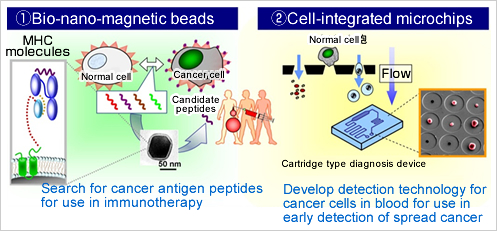This project was finished with the fiscal year 2012.
Home > Research themes > Establishment of a bio-chip technology for early diagnosis and treatment of cancer
Main content starts here.
Establishment of a bio-chip technology for early diagnosis and treatment of cancer
Tomoko Yoshino, Associate Professor of Bio-Function and Bioprocesses at the Institute of Engineering, Tokyo University of Agriculture and Technology
(FY2010-2012)
Aims and Expected Results of Research
This research aims to contribute to cancer treatment by implementing support for early diagnoses of free-floating cancer cells in blood using cell-integrated microchip technology and by developing a method of locating antigenic peptides using bio-magnetic beads.
It is expected that these results will become the basis for the creation of a reagent and a kit for MHC magnetic beads, along with the commercialization of said microchips.
- This research aims to establish an efficient cancer antigenic screening method utilizing the ability of bio-magnetic beads to effectively clean via magnetic separation.
- Our research of cell-integrated microchips aims to implement sensory microchips able to collect broken-off tumor cells circulating the blood (CTCs) with great efficiency and selectivity using the cells' size and deformative properties (high density).

FY2011 results
- In regards to the bio-magnetic beads, we developed both antigen peptide-MHC molecular fused protein expressing magnetic beads capable of maintaining their structural arrangement, as well as temperature responsive MHC-expressing magnetic beads able to detach peptides using temperature change. Using these, we conducted investigations into ways of identifying peptide sequences and peptide concentration / liquation protocols.
- In regards to the cell-integrated microchips, we built prototypes of tiny hole-shaped microchips, as well as disposable integrated cell-type microchips. Also, with the cooperation of the pulmonary medicine department at the Shizuoka Cancer Center, we conducted a search for CTCs on clinical specimens of non-small-cell lung cancer and found the microchips to have a higher rate of detection when compared to the CellSearch System.


